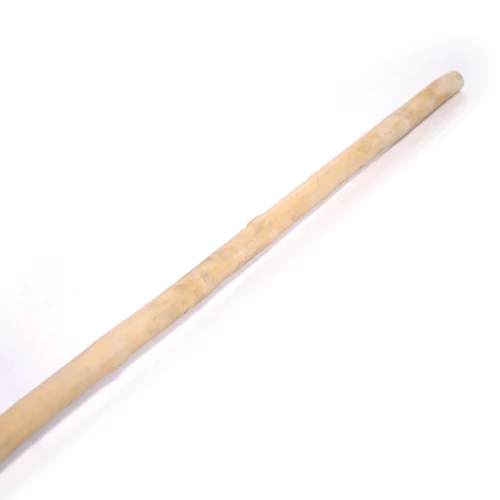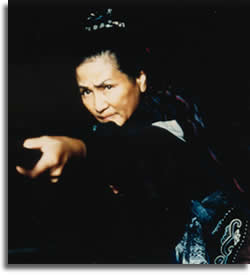 Tucked away in an obscure Chinese restaurant in West LA with a name that sounds like an English question, I'm eating vegetarian with unquestionably Hong Kong's foremost cinematic kung fu queen, silver screen legend and devout Buddhist, Cheng Pei-pei. Dressed in blue jeans, a shirt with college initials and a smile as big as her heart, she is the lady that Angela Mao Ying, Kara Hui Ying-hong and Michelle Yeoh try to emulate. Of course other female martial arts stars were big at the same time, like Josephine Ciao (Jet Li's mother in FONG SAI YUK) and Xu Fung (lead swordswoman in A TOUCH OF ZEN), but none have done more for the genre than Cheng.
Tucked away in an obscure Chinese restaurant in West LA with a name that sounds like an English question, I'm eating vegetarian with unquestionably Hong Kong's foremost cinematic kung fu queen, silver screen legend and devout Buddhist, Cheng Pei-pei. Dressed in blue jeans, a shirt with college initials and a smile as big as her heart, she is the lady that Angela Mao Ying, Kara Hui Ying-hong and Michelle Yeoh try to emulate. Of course other female martial arts stars were big at the same time, like Josephine Ciao (Jet Li's mother in FONG SAI YUK) and Xu Fung (lead swordswoman in A TOUCH OF ZEN), but none have done more for the genre than Cheng.
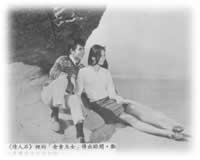 Most moviegoers in the West know her as the villainess Jade Fox in CROUCHING TIGER, HIDDEN DRAGON, the wise and mysterious governess to the youthful aristocrat Jen, whose only goal in life is to kill Chow Yun Fat's character. In Asia, she's something like a female Bruce Lee wrapped up in Jackie Chan. Now that puts it into perspective. Kungfumagazine.com is honored to get an exclusive interview with Ms. Cheng, who laughingly shares, "Actually, my English name is 'Regina.' It was given to me by my uncle, an English teacher in Hong Kong."
Most moviegoers in the West know her as the villainess Jade Fox in CROUCHING TIGER, HIDDEN DRAGON, the wise and mysterious governess to the youthful aristocrat Jen, whose only goal in life is to kill Chow Yun Fat's character. In Asia, she's something like a female Bruce Lee wrapped up in Jackie Chan. Now that puts it into perspective. Kungfumagazine.com is honored to get an exclusive interview with Ms. Cheng, who laughingly shares, "Actually, my English name is 'Regina.' It was given to me by my uncle, an English teacher in Hong Kong."
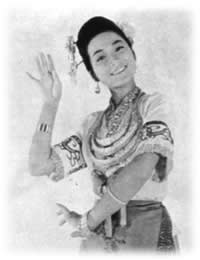 Cheng was born in 1946 in Shanghai. The Japanese have been defeated, Chiang Kai-shek is on the run and Communism is on the horizon. It's a time and place most of us have no concept about. "Growing up in Shanghai during the 1950s," Cheng ponders, "that time was good in the sense that society was changing, and because of that time, the way things were, everybody was on a different road of life. I learned a lot about the basics of life. But on the other hand, before WWII, my father was Kuomintang, and after the war he tried to be a businessman and opened up a factory called Ying Xiong Tai. It's still there, but of course the family doesn't own it anymore because it all goes to the government after several years of having it. As a businessman in China he thought it would be okay, but during the Korean War he tried to change and shift parties. But the Communist Party think he's a traitor, so they send him to prison in Mongolia for 15 years."
Cheng was born in 1946 in Shanghai. The Japanese have been defeated, Chiang Kai-shek is on the run and Communism is on the horizon. It's a time and place most of us have no concept about. "Growing up in Shanghai during the 1950s," Cheng ponders, "that time was good in the sense that society was changing, and because of that time, the way things were, everybody was on a different road of life. I learned a lot about the basics of life. But on the other hand, before WWII, my father was Kuomintang, and after the war he tried to be a businessman and opened up a factory called Ying Xiong Tai. It's still there, but of course the family doesn't own it anymore because it all goes to the government after several years of having it. As a businessman in China he thought it would be okay, but during the Korean War he tried to change and shift parties. But the Communist Party think he's a traitor, so they send him to prison in Mongolia for 15 years." 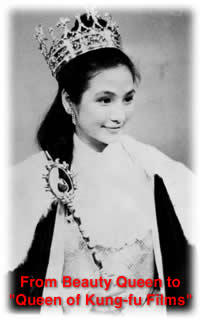
A moment of silent reflection later, she continues in her accented English, "I was very little at that time, my sister Shirleen was just born and it hurt me deeply. My mother divorced my father and left Shanghai and moved to Hong Kong in the 1950s. I was the only one left in Shanghai because I'm the oldest. Many of us (other actors from the Shaw Brothers Golden Age of film) are like that. When we came to Hong Kong, it was hard because we didn't know anyone and couldn't speak English, so we decided to act because we speak mandarin and that was being used in films."
Cheng received secondary school education in Shanghai and also accrued six years of ballet training, training that was in reality supposed to be for her other younger sister.
Pei-pei explains, "Yes, this happened before my mother left for Hong Kong. She wanted my other younger sister, who now lives in London -- she was five, I was eight -- but she wanted her to learn ballet at a private school. The teacher was Russian. I'd take her to class, she didn't want to go. During her class I'd watch and practice outside. The teacher saw that and told my mother not to waste money teaching my sister. But my mother said I'm not artistic and thought I couldn't do it. I'm very quiet back then, didn't talk much, maybe because of my family background or I'm the oldest sister and always must take care of my younger sisters and brother. But I got to learn ballet, I'm glad I did. So after I was left all alone in Shanghai, I at least had something to do, and next I learned Chinese dancing and taught dancing." 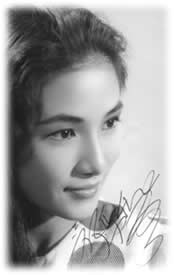
The farthest thing from Cheng's mind as she developed her dancing skills was that they would become very useful in martial art films, a genre that was virtually non-existent in mainland China while she was growing up.
"I just wanted to be a dancer," she recalls. "Because you don't need to talk to express yourself, I could use my body. My hobby growing up in Shanghai was watching films. I watched them all the time, but there weren't many wu xia kung fu films around. In fact, I don't remember seeing any. I'd go to Hong Kong in the summers to visit my mom and sisters, but didn't stay long because I didn't like Hong Kong. People were different, playing mahjongg and nothing to do. I think because of my family background it made things pretty bad for me, and I hated that because I always felt that I could really do a lot more. But what could I do?" 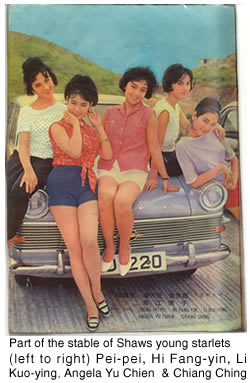
In 1962 Pei-pei moved to Hong Kong and pursued a career in film by enrolling in the Actor's Training Course at Shaw Brothers in 1963 where she was taught everything about film, acting, and many other crafts, all in the name of preparing her for film. Because she knew how to dance, Cheng would perform in Chinese opera houses alongside famous opera teacher Yu Shan-yuan's fostered group of youngsters, who went by the moniker "Qi Xiao Fu," also known as the "Seven Little Fortunes," i.e. Jackie Chan, Sammo Hung and all their Peking opera brothers.
Cheng recalls, "Me and Zhang Ching (also became a famous actress) had this number we did where I'd dress up as a boy and she would play a girl and we'd perform this dance."
This act caught the eye of Shaw Brothers. At that time, Ivy Ling Po was one of Shaw Brothers' most famous actresses, known for playing male characters in Huangmei opera films. In fact, it was her portrayal of Hua Mulan in the Shaws LADY GENERAL HUA MULAN (1964) that was the impetus for Disney's MULAN. Run Run Shaw's idea was to make Cheng the next Ivy Ling Po.
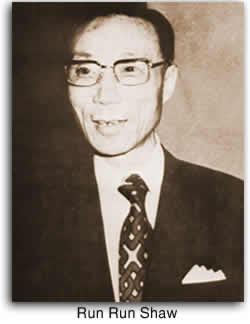 "Run Run also thought I looked like Ivy, and so he wanted me to be like her. So even before I graduated from their acting school, he had me sign a contract with Shaws. So in my screen debut (THE MAGIC LAMP (1963)), I played a male character. But I was too young, so to make me older I wore a moustache. I learned a lot from the director Yueh Feng and felt very lucky that my first film was a good film with a well-known and good director. The biggest lesson I learn from him was that he told me not to be in a hurry to be famous and earn lots of money. He taught me well. I also did the dance choreography in that film."
"Run Run also thought I looked like Ivy, and so he wanted me to be like her. So even before I graduated from their acting school, he had me sign a contract with Shaws. So in my screen debut (THE MAGIC LAMP (1963)), I played a male character. But I was too young, so to make me older I wore a moustache. I learned a lot from the director Yueh Feng and felt very lucky that my first film was a good film with a well-known and good director. The biggest lesson I learn from him was that he told me not to be in a hurry to be famous and earn lots of money. He taught me well. I also did the dance choreography in that film."
And what was pay like back then? Pei-pei's contract was for HK $400 a month (less than US $50/month,) which she laughingly admits was considered a lot back then where a big budgeted film would have a price tag of around US $50,000. Also keep in mind that actors lived in dormitories on the Shaw's lot, ate, slept and worked there all day and could be working on three or more films at the same time while still earning the same monthly paycheck.
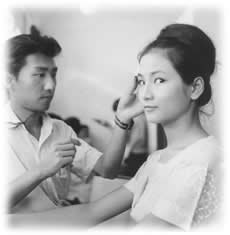 With her much acclaimed performance in director Pan Lei's THE ROCK (1964), Pei-pei became the first Asian actress to receive the Golden Knight Award from the International Independent Producers' Association. Pan was the screenwriter for Jackie Chan's NEW FIST OF FURY (1977). After starring in the opera film SONG OF ORCHID ISLAND (1965), she seemed destined to become another of Shaw's cute lady opera film stars. But as luck would have it, she was approached by King Hu, a young up-and-coming actor/screenwriter commissioned by Shaw Brothers to come up with something that had never been done before in a swordsman film: make it a swordswoman movie.
With her much acclaimed performance in director Pan Lei's THE ROCK (1964), Pei-pei became the first Asian actress to receive the Golden Knight Award from the International Independent Producers' Association. Pan was the screenwriter for Jackie Chan's NEW FIST OF FURY (1977). After starring in the opera film SONG OF ORCHID ISLAND (1965), she seemed destined to become another of Shaw's cute lady opera film stars. But as luck would have it, she was approached by King Hu, a young up-and-coming actor/screenwriter commissioned by Shaw Brothers to come up with something that had never been done before in a swordsman film: make it a swordswoman movie.
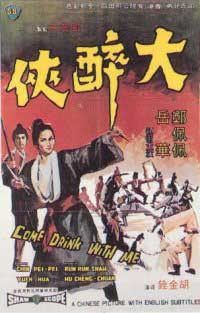 So in 1966 Pei-pei starred in what is arguably one of the most influential wu xia films in Hong Kong cinema history, COME DRINK WITH ME. Its blazing success launched Pei-pei into superstardom, making her Hong Kong's first official kung fu screen queen. Films like DRAGON CREEK (1966), THE THUNDERING SWORD (1967), JADE RAKSHA (1968), GOLDEN SWALLOW (1969), SHADOW WHIP (1970), and LADY HERMIT (1971) quickly solidified her stardom and future place in kung fu cinema history.
So in 1966 Pei-pei starred in what is arguably one of the most influential wu xia films in Hong Kong cinema history, COME DRINK WITH ME. Its blazing success launched Pei-pei into superstardom, making her Hong Kong's first official kung fu screen queen. Films like DRAGON CREEK (1966), THE THUNDERING SWORD (1967), JADE RAKSHA (1968), GOLDEN SWALLOW (1969), SHADOW WHIP (1970), and LADY HERMIT (1971) quickly solidified her stardom and future place in kung fu cinema history.
Yet she frankly admits, "I have never considered myself a martial arts lady, I'm really a dancer. I tell my children that it's a bonus to be a dancer because you are graceful, can kick high, bend low. But kung fu is different; you must learn to use your power, and the body types are different. In CROUCHING TIGER, people ask me how come Chow Yun-fat doesn't know how to fight? I tell them it's not important, because he's an actor and the movie is a movie and not a documentary. Fights are universal, but in drama you must know your culture and accept that; otherwise you won't understand why something happens the way it does. Love in Chinese and Western films are communicated differently, but fights are the same, and we can understand what they're fighting about.
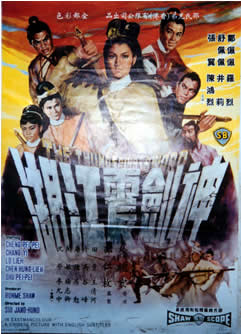 "I also don't consider myself a kung fu star. I love doing kung fu films and fights and don't like to use doubles. I've done tons of wire work, but in small productions it has bad standards. The stuntmen bounce around and get hurt and try not to show pain, but you can also die.
"I also don't consider myself a kung fu star. I love doing kung fu films and fights and don't like to use doubles. I've done tons of wire work, but in small productions it has bad standards. The stuntmen bounce around and get hurt and try not to show pain, but you can also die.
"I used to get injured a lot and my ankles were always twisted. The worse one was with Lo Wei, a Golden Harvest Film, NONE BUT THE BRAVE. I was married, had children, and the stunt coordinator wants be to jump down from a second floor window in a split. But my legs are too long, so my legs hit the window and then hit my nose when I jumped. I was out cold. I also broke my ankle, but I insist that I finish the scene because I didn't want to hold up production and lose any money."
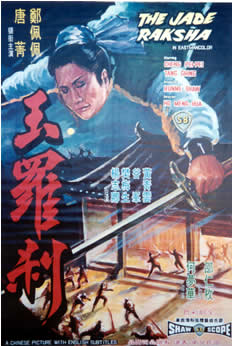 In the early '70s and after great success, Pei-pei retired from film and immigrated to America, where she attended business school at UC Irvine. "It was hard to leave film," she elucidates. "I left because of marriage, and my ex-husband didn't like me to act and said I should study, saying how could I make film and not have a degree? I was pregnant eight times and -- of course as you know -- only had three daughters and one son." A moment of silence. "Maybe I was doing too much, so had many miscarriages."
In the early '70s and after great success, Pei-pei retired from film and immigrated to America, where she attended business school at UC Irvine. "It was hard to leave film," she elucidates. "I left because of marriage, and my ex-husband didn't like me to act and said I should study, saying how could I make film and not have a degree? I was pregnant eight times and -- of course as you know -- only had three daughters and one son." A moment of silence. "Maybe I was doing too much, so had many miscarriages."
A divorce later and after much soul searching, Pei-pei decided to return to Hong Kong and start anew. "Again it was hard to leave my children and go back to film. I had a son, I had reached 40 and decided to start my own production company and do things for the Chinese community and do documentaries about Chinese history all around America. I did pretty good with that, but I was bad with financial stuff. That's why I divorce my husband; to him it's all about making money. So after I divorced and was bankrupt, I return to Hong Kong and start acting again."
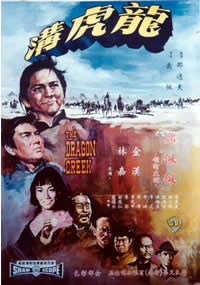 Pei-pei wisely played parts that matched her age instead of trying to pursue kung fu lady parts or do things she was known for during her younger years. Are you listening Chan, Stallone and Schwarzenegger? But she swore that she would never play the villain. Until...
Pei-pei wisely played parts that matched her age instead of trying to pursue kung fu lady parts or do things she was known for during her younger years. Are you listening Chan, Stallone and Schwarzenegger? But she swore that she would never play the villain. Until...
"I had this TV show called "Pei-pei Time" where I'd interview film people on TV. One of my guests was a younger director called Ang Lee when he was directing PUSHING HANDS. We became friends. Once day when I was in Hawaii, he flew out to see me and told me he wants to make a martial arts film and that I would be in it. I thought about it, but I didn't hear from him for a long time, so I thought, 'Oh well.' But then around Chinese New Year of about 3 years ago now, he was looking for me around the world and showed up in Taiwan. At a banquet he said, 'Do you mind being a bad guy?' I said, 'Do I look like a bad guy?' He said nothing. A few months later my daughter was moving to New York and I went to celebrate her birthday. He lived close by, told me the story, I like it. Then one day I'm doing a film in Beijing and he came by and said, 'We should start training.'"
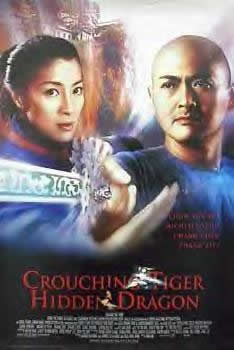 Of course she is talking about CROUCHING TIGER.
Of course she is talking about CROUCHING TIGER.
Pei-pei's life has taken many twists and turns, and later in life, to remain grounded, she turned to Buddhism. She retrospectively explains that everything happens in two ways. Nothing is very good and nothing is very bad. Bad things have good sides and good things have bad sides.
"Like my marriage," she posits, "I learn a lot from that. I don't say marriage is not good or that divorce is good. I think good things. I wasn't that way before, when I was young. I was very strict then; things were either good or bad. So I believe bad things go, good things come."
When I close by asking what good things are coming for her, she excitedly relates, "Well, I'm president of the King Hu foundation, so I'm working on getting together a remake of COME DRINK WITH ME in his honor, and as you know Chang Cheh passed away recently, so I'm also working on getting a remake done of GOLDEN SWALLOW. I'm not concerned about being famous after CROUCHING TIGER; that's not my way of life. But I do have a dream. I love to try and do CDWM as a Western style musical."
Now that sounds like a pretty freaky, wacky, and totally far-out idea -- yet intriguing. Drink anyone?
About
Craig Reid :
![]() Written by Craig Reid for KUNGFUMAGAZINE.COM
Written by Craig Reid for KUNGFUMAGAZINE.COM
![]() Print Friendly Version of This Article
Print Friendly Version of This Article












